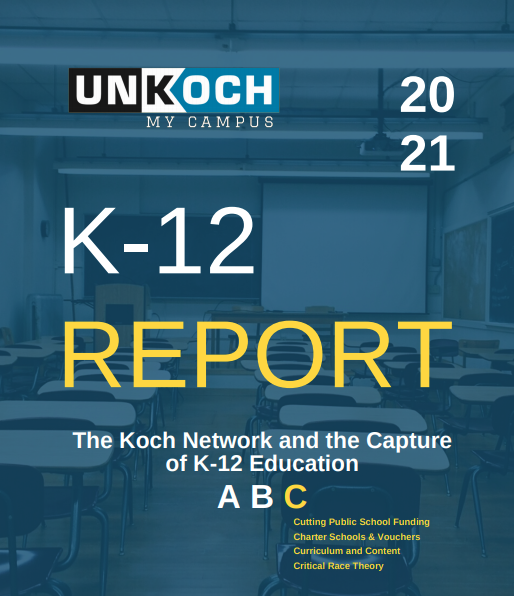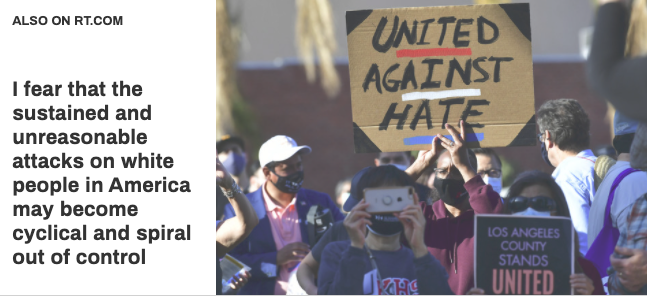The Russian TV channel known as RT (formerly Russia Today) has jumped into the growing controversy in the US over so-called “Critical Race Theory” or CRT. The RT article defends Christopher Rufo, an American conservative activist known for his attacks on what RT describes as “neo-Marxist critical race theory”:
June 21, 2021 Christopher Rufo apparently made himself prey by becoming a top critic of neo-Marxist critical race theory (CRT), but he’s firing back at the Washington Post over an article that sought to pick apart and discredit his arguments. “The Washington Post’s Laura Meckler spent three weeks preparing a hit piece against me,” Ruffo said Sunday on Twitter, adding that the newspaper used five “flat-out lies” to smear him. “This is how the media lies.” The WaPo article, which was published on Saturday, placed Rufo at the center of a Republican push to attack CRT and use it as a political weapon to portray Democrat policies as extreme, scary and anti-American. Meckler attempted to show that Rufo has misled the public about the nature of CRT and has made claims about training materials that go further than the documents that he cites. But Rufo countered that the article was intentionally misleading and he demanded that the newspaper’s editors issue an immediate correction and retract all false statements. “Democracy dies when the media lies,” he said, alluding to WaPo’s slogan of “Democracy dies in darkness.” The documentarian, who has exposed the teaching of CRT in schools, government agencies and corporations, said the Post first lied by presenting the theory as a “benign academic concept” that merely claims racism in America is systemic. The description obscures the extreme concepts of CRT, he said, such as “all white people are racist,” “abolish the white race” and “anti-capitalism.”
Read the rest here.
A US educational publications defines CRT as follows:
Critical race theory is an academic concept that is more than 40 years old. The core idea is that racism is a social construct, and that it is not merely the product of individual bias or prejudice, but also something embedded in legal systems and policies. The basic tenets of critical race theory, or CRT, emerged out of a framework for legal analysis in the late 1970s and early 1980s created by legal scholars Derrick Bell, Kimberlé Crenshaw, and Richard Delgado, among others. A good example is when, in the 1930s, government officials literally drew lines around areas deemed poor financial risks, often explicitly due to the racial composition of inhabitants. Banks subsequently refused to offer mortgages to Black people in those areas.
However, as the Washington Post article in question points out, in March of this year, Rufo appears to have tweeted that his goal was to use CRT as a catchall concept “to annex the entire range of cultural constructions that are unpopular with Americans.
We have successfully frozen their brand—“critical race theory”—into the public conversation and are steadily driving up negative perceptions. We will eventually turn it toxic, as we put all of the various cultural insanities under that brand category.
The goal is to have the public read something crazy in the newspaper and immediately think “critical race theory.” We have decodified the term and will recodify it to annex the entire range of cultural constructions that are unpopular with Americans.
The apparent disinformation effort appears to have wildly succeeded. As NBC News has observed:
Conflicts like this are playing out in cities and towns across the country, amid the rise of at least 165 local and national groups that aim to disrupt lessons on race and gender, according to an NBC News analysis of media reports and organizations’ promotional materials. Reinforced by conservative think tanks, law firms and activist parents, these groups have found allies in families frustrated over Covid-19 restrictions in schools and have weaponized the right’s opposition to critical race theory, turning it into a political rallying point. While the efforts vary, they share strategies of disruption, publicity and mobilization. The groups swarm school board meetings, inundate districts with time-consuming public records requests and file lawsuits and federal complaints alleging discrimination against white students. They have become media darlings in conservative circles and made the debate over critical race theory a national issue.
In 2017, the NYT characterized RT as follows:
Analysts are sharply divided about the influence of RT. Pointing to its minuscule ratings numbers, many caution against overstating its impact. Yet focusing on ratings may miss the point, says Peter Pomerantsev, who wrote a book three years ago that described Russia’s use of television for propaganda. “Ratings aren’t the main thing for them,” he said. “These are campaigns for financial, political and media influence.” RT and Sputnik propel those campaigns by helping create the fodder for thousands of fake news propagators and providing another outlet for hacked material that can serve Russian interests, said Ben Nimmo, who studies RT for the Atlantic Council. Whatever its impact, RT is unquestionably a case study in the complexity of modern propaganda. It is both a slick modern television network, dressed up with great visuals and stylish presenters, and a content farm that helps feed the European far right. Viewers find it difficult to discern exactly what is journalism and what is propaganda, what may be “fake news” and what is real but presented with a strong slant.
The controversy in the US over CRT would seem to be ideally suited to “feed” the far right in both the US and Europe as well.
Past Global Influence Operations Report (GIOR) reporting on RT has included:
- A March 2021 report on a growing dispute between Germany and Russia over the establishment of an RT (formerly Russia Today) TV channel in Germany.
- A January report on a new Washington, DC production company incorporated by an individual who has held various positions at RT
- A November 2020 report on Russian disinformation efforts targeting the EU and with a particular emphasis on Russian-backed media operations such as RT (formerly Russia Today) and Sputnik.
- A November 2020 report on an RT OpEd suggesting that “US democracy really is in its death throes.”









COMMENTS
Comments are closed here.